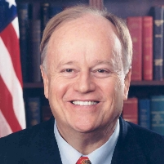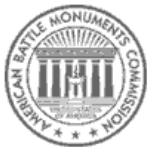President Obama’s choice to be in charge of the
American Battle Monuments Commission is a grievously wounded Vietnam veteran, twice decorated for bravery. Former U.S. Senator Max Cleland, who lost his Senate seat in an ugly and controversial re-election campaign in 2002, is the first non-General and first Vietnam combat veteran to chair the commission. The Commission, which was established after World War I, administers, operates and maintains on foreign soil 24 permanent American burial grounds, and 25 separate memorials, monuments and markers, including three memorials in the United States.
Born on August 24, 1942, in Atlanta, Georgia, Joseph Maxwell Cleland earned his B.A. in History from Stetson University in 1964 and his M.A. in History from Emory University in 1965. An ROTC cadet at Stetson, Cleland began active duty in the Army in 1965 as a Second Lieutenant, eventually rising to the rank of Captain. In 1967 he volunteered for duty in Vietnam, where he was awarded the
Silver Star and the
Bronze Star for valorous action in combat, including during the
Battle of Khe Sanh on April 4, 1968. On April 8, 1968, Cleland, a Battalion Signal Officer, was sent to set up a radio relay antenna on a hilltop. As he left the helicopter that had transported him and two other soldiers, he reached for a fallen grenade. It exploded and Cleland lost both his legs and half of his right arm. After spending 18 months at Army hospitals, Cleland was discharged and returned to Georgia.
In 1969, Cleland testified before the
U.S. Senate Committee on Veterans’ Affairs to describe the difficulties veterans were experiencing returning home from Vietnam. The following year, Cleland began his lengthy career in public service by winning election to the Georgia State Senate. As the youngest member of the Georgia Senate at age 28, he wrote the state law making public facilities in the state accessible to the elderly and the handicapped. After four years in the State Senate, Cleland relocated to Washington, DC, to take a job with the Senate Committee on Veterans Affairs, where he worked from 1975 to 1977. While Cleland was in the State Senate, he formed a close political alliance and personal friendship with Georgia’s governor, Jimmy Carter. In 1977, when Carter took over as president of the United States, he appointed Cleland Administrator of the
Veterans Administration, which was not a Cabinet-level department at that time. Cleland served in that position until 1981, when Republican Ronald Reagan defeated Carter in his bid for re-election.
In 1982, Georgia voters elected Cleland Secretary of State, the youngest in the state’s history. In that position, Cleland fought for tougher campaign finance laws and cracked down on securities and telemarketing fraud. In 1995, he implemented the National Voter Registration Act (“motor voter”) in Georgia, which added almost one million new voters to the rolls. In 1995, he resigned his position as Secretary of State to run for the U.S. Senate seat being vacated by retiring Senator Sam Nunn. Despite being out-spent three to one, Cleland won the race, eking out a narrow 30,000-vote victory. He was sworn-in to the United States Senate in 1997. While in the Senate, Cleland became known as a moderate Democrat, voting for President George W. Bush’s tax cuts in 2001 and the Iraq authorization of the use of force resolution in 2002, yet generally supportive of abortion rights and environmental issues.
In 2002, Cleland ran for re-election against Republican Saxby Chambliss, who had avoided military service thanks to a football-related knee injury. Nonetheless, Chambliss aired a TV attack ad that challenged Cleland’s commitment to defending the United States against its enemies by accusing him of voting against the formation of the
Department of Homeland Security (DHS). Cleland had voted to give DHS employees civil service protection, which Bush opposed. The ad failed to point out that Cleland supported the creation of a Department of Homeland Security before Bush did, and that Cleland’s “no” votes were on procedural questions. The Republican attack ads made it look as though Cleland was voting against Homeland Security itself, and one TV ad morphed Cleland’s face into Saddam Hussein’s while suggesting that Cleland was indifferent to the safety of the American people. The ad was so controversial that
Republican Senators Chuck Hagel and John McCain both protested, leading the Chambliss campaign to stop airing it. The race was consider a toss-up, but on Election Day Chambliss won handily, 53%-47%. Nevertheless, Cleland’s loss raised him to martyr status within Democratic Party circles, where he has remained popular ever since.
The year following his election loss, Cleland became increasingly concerned about the course of the War in Iraq, and wrote an influential and deeply
critical
article about the Bush administration’s war policies, which compared Iraq to Vietnam and concluded by taunting Bush, who did not serve in the military in Vietnam, with the words, “Welcome to Vietnam, Mr. President. Sorry you didn’t go when you had the chance.” Cleland was appointed to the
9/11 Commission
, but resigned because he believed its ability to do a thorough job was being hampered by what he called the Bush administration’s
“Nixonian” efforts
to conceal important evidence about the government’s failures in the weeks before the attacks. In 2004, Cleland was active in Democratic Senator John Kerry’s failed Presidential campaign. Also in his post-Senate years, Cleland became a distinguished adjunct professor at American University’s Washington Semester Program, where he also served as a fellow at the
Center for Congressional & Presidential Studies
. Between 2003 and 2007, Cleland served on the
Board
of the
Export-Import Bank
. Cleland has written three books:
Strong at the Broken Places
,
Going for the Max!: 12 Principles for Living Life to the Fullest,
and the soon to-be-published
Heart of a Patriot: How I Found the Courage to Survive Vietnam, Walter Reed and Karl Rove.






